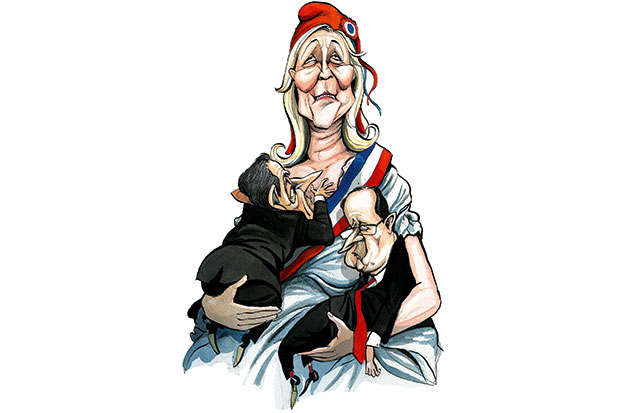I had an illuminating argument with a Socialist friend at the weekend. It began when I expressed my surprise that greater Paris has just passed a law compelling construction workers to speak only French. The ‘Moliere clause’ in the ‘Small Business Act’ requires all firms engaged in publicly-funded building projects to talk French. The intention is to stop foreign workers, particularly those from eastern Europe, taking the jobs of French builders and undercutting local companies.
I suggested to my friend that the bill, which is already in force in Normandy, Hauts-de-France and Auvergne-Rhone-Alpes. is discriminatory. Not at all, retorted my friend, it’s common sense.
I see. In which case, I ventured, so are Marine Le Pen’s ‘French first’ election pledges to tax imports as well as the employment contracts of foreigners, and limit certain rights – such as free education – to French citizens only.
That set the chat among the pigeons. Marine Le Pen is a racist, hissed my friend. In which case aren’t the authorities in Paris, Normandy, Hauts-de-France and Auvergne-Rhone-Alpes also racist for putting the French first? I was told that was ‘different’. How is it different? It just is. Le Pen is a racist.
When I asked my friend for examples of Le Pen’s racism none was forthcoming. It’s the same with much of the English language mainstream media, who are becoming ever more desperate in their attempts to portray the National Front leader as a chip off the old Le Pen block, a task made more challenging with the decision on Tuesday by the European Court of Justice to allow staff to be banned from wearing headscarves, something Le Pen has been advocating for years.
Before Le Pen’s interview on Wednesday with Nigel Farage on LBC, anti-racist organisation Hope not Hate described the broadcaster’s decision to give the National Front air time as ‘extraordinary’ and the Guardian noted disapprovingly that Le Pen had said ‘French people would have priority when it came to jobs’.
The French media have realised that portraying the National Front as fruit cakes, loonies and closet racists is counter-productive. Le Pen has gone to great lengths since taking command of the party in 2011 to eradicate the bigotry of her father, a strategy known as the un-demonising of the National Front. One of their councillors in Nice was immediately suspended on Tuesday for questioning the extent of the Holocaust.
The clean-up operation appears to be working. Last week Le Figaro published an article in which it stated that ‘the ideas of the National Front are progressing’, with a survey revealing that 33 per cent of people canvassed agreed with their manifesto, rising to 48 per cent among the working-class.
Such is the growing concern on the left that the National Front could win the election that on Saturday president Francois Hollande made his first direct intervention on the campaign trail. He warned his party to be on its guard against nationalism ‘and all its forms of extremism, isolationism, protectionism and egoism’.
On the same day Liberation devoted its first seven pages to the National Front with an editorial headlined ‘Alarm Bells’. This is no time for complacency, warned the newspaper, because the left can no longer blithely assume that if, as expected, Marine Le Pen wins through to the second round voters will gang up to block her path to the Élysée Palace as they did to her father in 2002. Liberation also admitted that in one respect the National Front has already achieved ‘an ideological victory’ in forcing none of her rivals to speak in favour of mass immigration.
The same can be said of Islam, a subject on which Le Pen rarely bothers to discuss these days. Why should she? Her position is well known and the never-ending news reports about the dismantlement of yet another Islamic terror cell in France act as the National Front’s most effective recruitment officer.
Liberation also carried a poll in which only 49 percent of people surveyed believed a National Front victory ‘would be a drama’ for France. Asked why they thought that, 46 percent cited Le Pen’s wish to leave the EU and 35 percent said they didn’t believe she could manage the economy. Only 27 percent said they were concerned about the fate of foreigners or foreign-born French people under a National Front government.
Le Pen has six weeks to convince voters that a vote for the FN wouldn’t be a vote for economic catastrophe. At a rally on Saturday she promised not only ‘to protect the savings of the French’ but to give back money to France that is being wasted in Brussels.
But what she must also keep working on if she wants to win the election is her image. When I ask my acquaintances if they could ever vote for the National Front, the most common response – if in the negative – is ‘I’ll never vote for Le Pen’. Not the National Front, but Le Pen. That’s why there’s even a noun to describe a National Front supporter – a ‘Lepéniste’.
The truth of the matter is that if the 48-year-old leader of the party was called Marine Dupont, and was the daughter of a village doctor, she would probably win the election with ease. But she’s a Le Pen, and it doesn’t matter that she drops the surname from her campaign literature or shares a sofa with a mixed-race TV interviewer while explaining her passion for baking and gardening; for many French people she will always remain the daughter of the bigoted bully-boy. This demon could prove the biggest obstacle to Le Pen’s path to power.







Comments